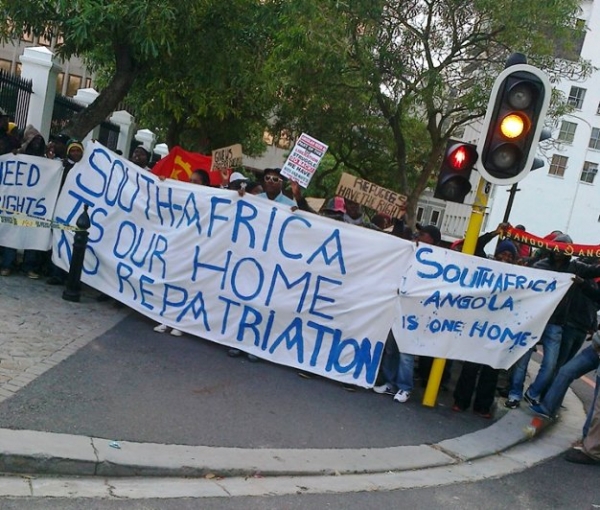
“Rosie” was born in 1987 in Angola, during the civil war. In 1997, her father brought her and her three siblings to Cape Town, where he dumped them in a shelter and disappeared. At the time, Rosie’s siblings’ ages ranged from five to eight years old. Rosie has lived in South Africa ever since. She spent ten years in Angola, eighteen years in South Africa, but she’s still a `refugee.’ The war has ended, and so Rosie and her siblings are now liable for deportation, or not. “We don’t know Angola as ‘home’. We want to get student visas so we can stay here. We don’t have anything to go back to,” Rosie explains.
Last Friday, various reports circulated claiming that the South African government was set to deport as many as 2000 Angolan refugees, as well as a smaller number of refugees from Liberia, Rwanda, Sierra Leone. Over the weekend, the State leapt into action, explaining that it “is firmly committed to ensuring the fulfilment of its international obligations towards refugees and asylum seekers in terms of its ratification of the relevant international protocols.” Which means less than nothing.
Angolan community leader Jao Kaputo has been in South Africa since 1994. He explains the difficulties many Angolans face in the various registration processes, “Our homes were bombed. We lost everything, including documents. We are dispersed; our mothers went their own directions, and our fathers the other direction. As a result some of us are not documented, including children born here, and cannot apply for birth certificates.”
“Pedro Nzazi” has been a refugee in South Africa for 20 consecutive years: “Starting over in Angola after 20 years of staying here will be very difficult. I have children at university and others still going to school. If I relocate to Angola, what will happen to them? Many Angolans, whose permits expired already are illegal, may be deported and they cannot access their bank accounts. I know five people who gave up and went back to Angola. They intend to apply for permits from there, but I am worried they might not be successful because of the strict immigration regulations gazetted on 22 May 2014.”
In 1989, Jesus Espirito Do Santos was born in Angola to a Congolese woman, Suzan Ntoto, and her Angolan husband. In 1992, Suzan Ntoto brought her three-year-old Jesus Espirito Do Santos to South Africa and applied for refugee status. In 2009, Ntoto died, and her South African employer offered to adopt Do Santos, but couldn’t because Do Santos couldn’t produce his birth certificate. In 2013, Do Santos, who speaks only English and Afrikaans, and not a word of Portuguese, faced “repatriation.”
Irene Kainda’s story is the same. She came to South Africa as a child refugee, grew up in Cape Town. She and her brother, Felipe, thrived, despite having been abandoned by their mother. And now she faces “repatriation” to a country she does not know that speaks a language she does not speak.
Everything about this is predictably wrong. One could argue that, while the civil war has ended, peace in Angola is still aspirational. For example, the past three months saw activists imprisoned for membership in a book club, and then their mothers were arrested. One could point to the gross injustice of Operation Fiela – Reclaim, an anti-immigrant sweep designed to “restore order” after the March – April Afrophobic, xenophobic pogroms in KwaZulu-Natal and Gauteng. South Africa’s firm commitment to the strangers in its midst under brutal attack has been to brutally attack those strangers. While the courts have temporarily stopped many of the deportations, the arrests continue, and the brutality intensifies in the Lindela Repatriation Centre. Here’s Fiela: a mountain of warrantless searches and improper arrests, deployment of the military as police, overly long stays in detention, evisceration of due process rights, intensification of xenophobia and Afrophobia. This does not restore or reclaim anything good. It merely terrorizes any South African-based, low to moderate income African born outside of South Africa.
The worst, though, is the willful imposition of inhumanity, the broad-brush practice of State terrorism and violence against those who came seeking succor and have actually thrived. The State will clothe its terrorism in legal language, but it remains terrorism. In South Africa today, what are the borders of being-a-refugee? When does one stop being a stranger and become simply a neighbor? Irene Kainda, Jesus Espirito Do Santos, “Pedro Nzazi”, Jao Kaputo, “Rosie”, and thousands of others want to know.
(Photo Credit: GroundUp)